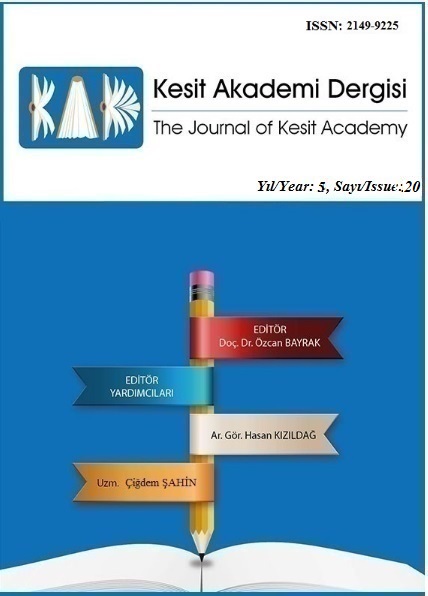Author :
Abstract
Eğitim ve kültür alanında gerçekleştirilecek olan başarılar, devletlerin devamlılığı ve kendilerini idame ettirecek nesillerin yetiştirilmesinde en önemli vasıtadır. Bu yüzden her devletin kendine özgü eğitim ve kültür politikaları vardır. Kültürel değerler ise, eğitimle desteklendiğinde milleti oluşturan bireyleri bir arada tutan, birlik ve beraberlik duygusu sağlayan harç görevi görmektedir. Osmanlı Devleti’nin mirası üzerinde kurulan Türkiye Cumhuriyeti de, bu devletin yıkılmasına neden olan sıkıntılardan kurtulmak, kendini payidar kılacak nesiller yetiştirmek amacıyla yeni eğitim ve kültür kurumları oluşturmuş, politikalar geliştirmiştir. Milli Mücadele’nin üç safhada gerçekleştiği kabul edilir. Birinci safhası düşmanı yurttan kovmadır. Bu amaca silahlı mücadele ile ulaşılmıştır. İkinci safhası tam bağımsızlıktır. Bu amaca Lozan Antlaşması’nda, kapitülasyonların her alanda kaldırılması ile ulaşılmıştır. Üçüncü safha ise milli, çağdaş, gelişmiş bir ülke olmaktır. İşte bu üçüncü safhada başarıya ulaşmak için eğitim ve kültür alanında atılımlar yapmak gerekmiştir. Bu dönemde Halifelik kaldırılmış, eğitim öğretim birleştirilmiş, Harf İnkılabı gibi çok zor bir inkılap yapılmış, kılık-kıyafetten takvime, rakamlardan ölçü birimlerine, kadın-erkek eşitliği ve hukuktan sanata ve ekonomiye toplumsal hayatın hemen her alanında yenilikler getirilmiştir. Atatürk ve dönemin devlet adamları yapılanları halka benimsetmek ve öğretmek için yurt gezileri düzenlemişler, Millet Mektepleri, Halk Evleri, Türk Dil Kurumu, Türk Tarih Kurumu gibi kurumları da bu dönemde hayata geçirmişlerdir.
Keywords
Abstract
The achievements in the field of education and culture are the vital means for the continuity of any states and the upbringing of generations to sustain these states. Therefore, each state has its own educational and cultural policies. Cultural values when supported by education serve as cement that hold the individuals who form the nation and provide a sense of unity and solidarity. The Republic of Turkey, founded on the heritage of the Ottoman Empire, has created new educational and cultural institutions and has developed new policies in order to solve the problems that caused the breakdown of the Ottoman state, educate next generation and maintain the republic. It is accepted that the independence war took place in three stages. The first stage was to expel the enemy from the country. This goal was achieved through armed struggle. The second stage was full independence of the country. This objective was achieved by the abolition of capitulations in all areas through Treaty of Lausanne. The third stage was to become a nation state, modern and developed country. It has been necessary to make progress in the field of education and culture in order to be successful in this last stage. During this period, the Caliphate was abolished and the law on unification of education was introduced. In addition to that very difficult revolutions were made in different areas of social life including the alphabet, clothing, calendar, numbers and measurement. Some law introduced in the field of art and economy and also in order to realise equality of women and men. Atatürk and the statesmen of the period organized nationwide trips to teach and help the people adopt the new reforms. Some crucial institutions were also established in this period including National Schools, Community Centres, the Turkish Language Society and the Turkish Historical Society.
Keywords
- Avcı, C. (2005). “Türk Tarih Tezi Amacı, Uygulanışı ve Sonuçları” A.İ.B.Ü. Sosyal Bilimler Ens- titüsü Dergisi, (11).
- İğdemir, U. (1973). Cumhuriyet’in 50. Yılında Türk Tarih Kurumu, Ankara: Türk Tarih Kuru- mu
- Karal, E. Z. (1977). “Tanzimattan Bugüne Kadar Tarihçiliğimiz”, Felsefe Kurumu Seminerleri, Ankara: Türk Tarih Kurumu
- Kocatürk, U. (1999). Atatürkün Fikir ve Düşünceleri, Ankara: Atatürk Araştırma Merkezi.
- Korkmaz, Z. (1995), “Atatürkçü Düşüncede Türk Dilinin Yeri”, Atatürkçü Düşünce El Kitabı, Ankara: Atatürk Araştırma Merkezi.
- Lewis, B. (1960). “Türkiye’de Tarihçilik ve Millî Uyanış”, Türk Yurdu, (2).
- Süslü, A. (1995). “Atatürk ve Tarih”, Atatürkçü Düşünce El Kitabı, Ankara: Atatürk Araştırma Merkezi.
- Şimşir, B. N. (1992). Türk Yazı Devrimi, Ankara: Türk Tarih Kurumu.
- Ülkütaşır, M. Ş. (1981). Atatürk ve Harf Devrimi, Ankara: Türk Dil Kurumu
- Yaşar, H. (2010). “Yurt Dışında Bir Kültür Kurumu Londra Halkevi”, Atatürk Yolu , (45).





